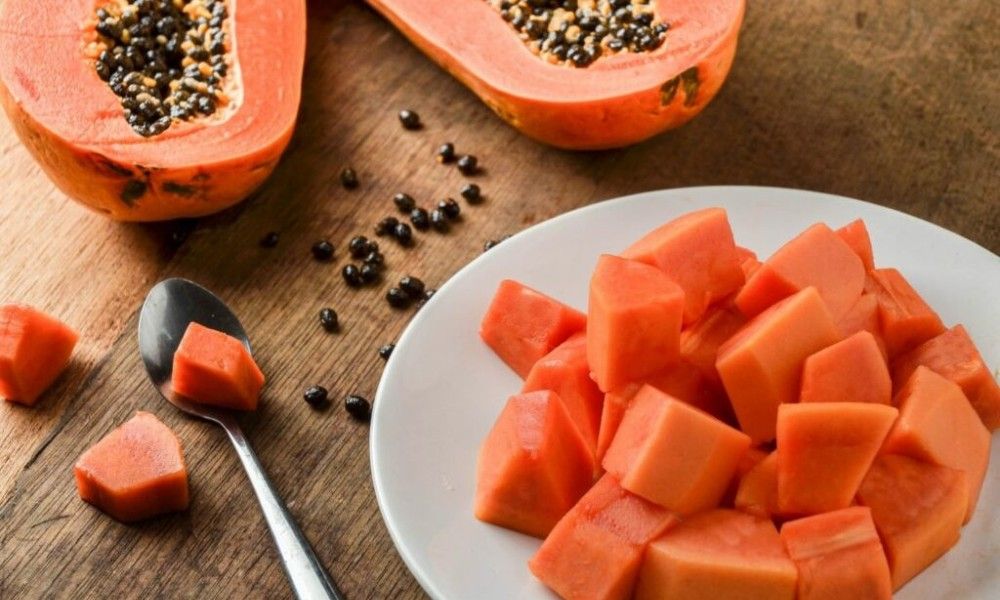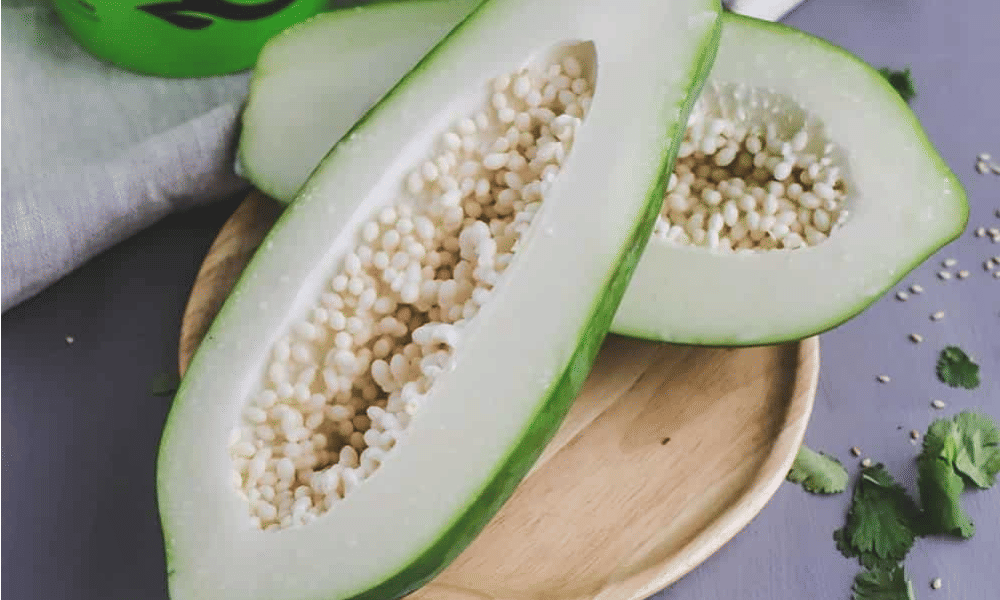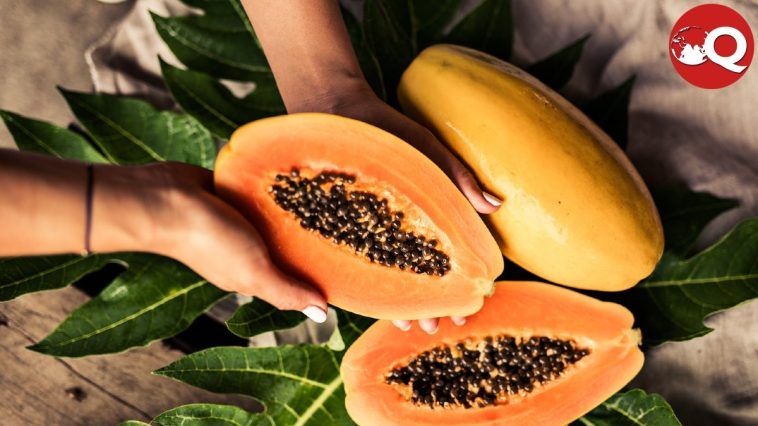Papaya Fruit: Health Benefits:
The papaya fruit is an excellent source of many nutrients, including vitamin C, vitamin A, potassium, and fibre. Enzymes like papain, which help with digestion and inflammation, can be found in this plant as well. Due to its antioxidant capabilities, papaya may reduce the chance of developing some chronic diseases and even help protect cells from damage. It has also been associated with a number of possible health benefits, including those for the heart, the immune system, and potentially cancer prevention. Simply said, the nutrient-rich nature of papaya ensures that it may be an integral part of a healthy diet that has many positive effects on health. Let’s have an elaborate discussion about the amazing benefits of Papaya:

Papaya is Rich in Nutrients:
As a tropical fruit, papaya is a great choice for improving one’s health because it contains many vitamins and minerals. Essential nutrients found in papaya include:
Vitamin C:
Papaya is rich in vitamin C, which contributes to a healthy immune system and a radiant appearance of the skin.
Vitamin A:
Papaya is a great source of vitamin A, which is necessary for healthy eyes and skin.
Fibre:
The fibre in papaya aids with digestion and makes you feel full and satisfied for longer.
Potassium:
The high potassium content of papaya is beneficial to cardiovascular health and the maintenance of normal blood pressure.
Enzymes:
One of the digestive enzymes in papaya is papain, which aids in protein digestion and promotes digestive health.

Because of its low-calorie content, papaya is a fantastic choice as a healthy snack for dieters and those concerned about maintaining a healthy weight.
Papaya Has Antioxidant Properties:
Papaya contains several antioxidants that have been shown to have health benefits. Papaya has a number of antioxidants, but one of the most notable is vitamin C, which neutralises free radicals and prevents oxidative stress in cells. Papaya includes carotenoids such as beta-carotene, which are beneficial to eye health and have anti-inflammatory qualities. Moreover, papaya has flavonoids including quercetin and catechins, which are known for their antioxidant and anti-inflammatory properties. Together, these antioxidants provide additional protection against oxidative stress, which has been linked to increased mortality from cancer and cardiovascular disease.

Digestive Health:
Papaya is an extremely healthy fruit that has multiple benefits for the digestive system. Papain, an enzyme found in papaya, aids in protein digestion by facilitating their breakdown. Its fibre content also helps keep you regular, which is great for avoiding constipation. Because of its high levels of antioxidants and anti-inflammatory compounds, this fruit can be useful in warding off a variety of gastrointestinal problems.
In addition to its positive effects on digestion, papaya’s low fat and calorie content make it a great choice for weight management. In addition, papaya is loaded with nutrients like vitamins A, C, and E, as well as folate and potassium, all of which contribute to a healthy digestive system. On the whole, eating papaya as part of a healthy diet can aid digestion and reduce the risk of digestive problems.
Anti-inflammatory Properties:
Papain, an enzyme found in papaya, has been shown to have anti-inflammatory effects. Antioxidants like vitamins A and C are easily available in this food, which helps lower oxidative stress and protects cells from damage. Papaya’s vitamin C also works as an anti-inflammatory, lowering inflammation brought on by conditions like arthritis and rheumatoid joint pain. The phytochemicals found in papaya seeds are responsible for the seed’s reputation as an anti-inflammatory food. In addition to strengthening the immune system and decreasing the risk of chronic diseases like heart disease, cancer, and diabetes. The anti-inflammatory properties of papaya contribute to a condition of general well-being.
Boosts Immunity:
The vitamins and minerals found in papaya are crucial in maintaining a healthy immune system. It’s a great source of vitamin C, a potent antioxidant that shields cells from damage caused by free radicals and encourages the body to make more of the infection-fighting white blood cells. Vitamin E and vitamin A both have been shown to increase the body’s natural resistance to disease, and both can be found in high amounts in papaya. In addition, papain and carotenoids are just two of the many anti-inflammatory enzymes and antioxidants found in papaya. Eating papaya regularly can strengthen your immune system and make you less susceptible to illness.

Heart Health:
One study found that eating papaya regularly improved cholesterol levels and blood pressure. Its high antioxidant content, from vitamin C and beta-carotene to other nutrients, helps defend against oxidative stress and inflammation, two major contributors to the onset of cardiovascular disease. The fibre in papaya is beneficial to heart health because it reduces cholesterol. Papaya also has the mineral potassium, which lowers blood pressure and protects against stroke and heart disease. Because of its low sodium content and high antioxidant content, papaya is a great fruit to eat if you have hypertension. You can help your heart and your health in general by making papaya a regular part of your diet and exercise routine.
Skin Health:
The skin may benefit from eating papaya because it is a healthy fruit. The high levels of antioxidant vitamins C and A found in this food help prevent free radical damage to the skin. Papain, one of the papaya enzymes, has been shown to aid in the exfoliation of dead skin cells, resulting in a more youthful and radiant appearance of the skin.

To start it all off, papaya has anti-inflammatory properties that calm irritated skin and lessen the visibility of redness and puffiness. Potassium, which helps the skin retain moisture, is also widely available in this food. There are many ways in which papaya consumption or the use of products containing papaya extract can benefit the health and appearance of the skin.
Potential Cancer Prevention:
Due to its high antioxidant and anti-inflammatory compound content, papaya has shown potential in cancer prevention. Cancer can be aided by free radicals, but antioxidants like vitamin C, vitamin A, and carotenoids can prevent this damage to cells. Papain has been shown to restrict cancer cell growth and hasten the death of damaged cells (apoptosis). Papaya contains compounds that have been shown to have anti-tumour effects and may also help to inhibit the formation of blood vessels that support tumour growth. However, more study is required to determine the optimal dose and consumption method of papaya for maximum benefits and to fully understand the potential of papaya in cancer prevention.
Papaya can be eaten at any time of the day as a snack or as part of a meal. However, it is often recommended to eat papaya on an empty stomach, such as in the morning, to maximize its potential health benefits. It is important to choose ripe papaya for optimal taste and nutrition. Let’s have an elaborate discussion about the best time to eat Papaya:
Best Time to Eat Papaya for Weight Loss:
Papaya is a low-calorie fruit that is high in dietary fibre, both of which can help with weight loss by easing digestion and keeping you feeling full longer. However, rather than relying solely on papaya for weight loss, it’s best to consume it in moderation as part of a balanced diet. Papaya is a nutritious fruit that can be eaten as breakfast food, an afternoon snack, or even as a meal.

Papaya is rich in fibre and contains enzymes that can aid digestion, making it a potentially useful aid in the fight against obesity. Several essential nutrients, such as vitamin C, folate, and potassium, can be found in abundance in this fruit. Although eating papaya can be part of a healthy weight loss plan, it is not a magic solution on its own. Essential components of any successful weight loss plan include a well-balanced diet, regular physical activity, and an overall healthy lifestyle.
You can also read:
Best Time to Eat Papaya for Constipation:
Consuming papaya first thing in the morning on an empty stomach is recommended if you’re trying to relieve constipation. Consuming papaya first thing in the morning is a great natural remedy for constipation because it helps to stimulate digestion and promotes regular bowel movements. Eating papaya first thing in the morning has additional benefits for your digestive system and overall health.
Papain, an enzyme found in papaya, aids in protein digestion and breakdown. Additionally, the fibre in papaya is helpful in avoiding and treating constipation. Moreover, its high water content and low-calorie count aid in maintaining a healthy digestive system and warding off constipation. In addition to helping maintain digestive health, the vitamin C, potassium, and folic acid that are abundant in papaya are excellent for the body’s overall health. Generally, eating papaya first thing in the morning on an empty stomach can be an efficient natural remedy for constipation.
Best Time to Eat Papaya at Night:
There is no specific time that is best to eat papaya at night. It is recommended to eat a balanced meal, including fruits, at any time that works with your schedule and dietary needs. However, eating a light snack, like a piece of fruit, before bedtime can help ensure a restful night’s sleep.
Disadvantages Of Eating Papaya:
- Allergic reactions: Some people have severe allergic reactions to papaya, including hives, swelling, and trouble breathing.
- Interaction with medications: The papain enzyme in papaya has been shown to reduce the effectiveness of anti-inflammatory drugs, blood-thinning medications, and even birth control.
- Digestive issues: Large quantities of papaya might lead to digestive issues such as bloating, gas, and diarrhoea.
- Latex allergy cross-reactivity: As papaya contains a similar protein to that found in latex, those with a latex allergy may also experience a reaction when consuming it.
- Pregnancy: Unripe papaya may not be safe for pregnant women as it contains a chemical that stimulates contractions.

The above-listed disadvantages may not apply to everyone, and the effects can vary from person to person. It is best to speak with a doctor or a healthcare professional before incorporating papaya into your diet.
What is the best time to eat Papaya?
There is no best time to eat papaya because it can be eaten as a healthy snack or as part of a meal at any time of the day. Some people like to eat papaya for breakfast, while others like to eat it as a midday snack or as part of a dessert. The most important thing is to add it to your diet in a way that works for you and fits your lifestyle and schedule.
Should we eat Papaya at night?
There is no clear rule about whether you should eat papaya at night or not. But some people think that because papaya has natural digestive enzymes, eating it at night can cause digestive problems. It also has a lot of fibre and antioxidants, which are good for your health as a whole. In the end, the best time to eat papaya is a personal decision that can depend on a person’s diet and eating habits.
What is the best time to eat Papaya seeds?
Papaya seeds can be eaten at any time of the day because there is no best time to eat them. Some people like to eat them with their meals as a side dish, while others eat them on their own as a snack. Since they have a strong, bitter taste, it is best to eat them in small amounts.
Can you eat Papaya after eating Yoghurt?
Yes, papaya is fine to eat after yoghurt. There is nothing about the way the two foods work together that would stop you from eating them together. But it’s important to remember that everyone’s digestive system is different, and some people may feel uncomfortable if they eat certain combinations of foods.
Can I eat Papaya during pregnancy?
Yes, most people think it’s safe to eat papaya in small amounts while pregnant. It is a healthy fruit that is full of antioxidants, vitamins, and minerals. But it’s best to talk to your doctor about your specific situation because some women may have bad reactions to papaya, especially if they have food allergies or have been sensitive to latex in the past. Also, it’s best not to eat unripe papaya because it has a chemical called papain that can cause contractions in the uterus and start labour early.
How much Papaya should I eat daily?
The quantity should be 100gms or 120gms
Can I eat Papaya empty stomach?
In addition, the digestive enzymes in papaya make it an effective detoxifier when consumed first thing in the morning on an empty stomach. It is also effective in preventing gas, indigestion, and constipation.
What not to eat after Papaya?
Papaya with lemon is a lethal combination that can cause anaemia and an imbalance in the haemoglobin levels and is extremely hazardous for children.
What are the side effects of Papaya?
Side Effects of Papaya:
Skin irritation.
Allergic reaction.
Uterine contractions (miscarriage)
Carotenemia (skin discolouration; yellowing of soles and palms)
Stomach upset.
Breathing difficulties or wheezing (whistling sound during breathing) …
Nasal congestion.
Is Papaya good for kidneys?
The fruit’s high potassium content makes it a fantastic aid to kidney function. It eliminates uric acid buildup in the blood and eliminates waste products stored in the kidneys. Payapa seeds are also useful for maintaining good renal function.



